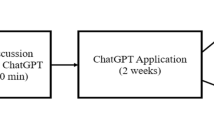Abstract
This article describes and analyses a short teaching episode in a multilingual secondary mathematics classroom in South Africa where the teacher is using a participatory-inquiry approach. The episode is used to illuminate the general claim that such an approach, because of the particular communicative demands it places on teachers and learners, can create specific dilemmas of mediation. Teachers are often aware of dilemmas they face. However, what can be obscured is how a participatory-inquiry approach can inadvertently constrain mediation of mathematical activity and access to mathematical knowledge.
Similar content being viewed by others
REFERENCES
Adler, J.: 1993, ‘Beyond ‘tell and drill’ maths’, The Weekly Mail and Guardian: Review/Education Supplement, Summer. p. 2.
Adler, J.: 1995, ‘Dilemmas and a paradox: secondary mathematics teachers' knowledge of their teaching in multilingual classrooms’, Teaching & Teacher Education 11(3), 263–274.
Adler, J.: 1996a, Secondary Teachers' Knowledge of the Dynamics of Teaching and Learning Mathematics in Multilingual Classrooms. Unpublished PhD dissertation, University of the Witwatersrand, Johannesburg.
Adler, J.: 1996b, ‘Lave and Wenger's social practice theory and the teaching and learning of mathematics’, in Puig, L. and Guiterrez, A. (eds) Proceedings of the 20th International Conference for the Psychology of Mathematics Education (PME20), Vol 2. University of Valencia, Valencia. pp. 3–10.
Apple, M.: 1982, (ed.) Cultural and Economic Reproduction in Education, Routledge & Kegan Paul, Boston.
Bartolini-Bussi, M. G.: 1995, ‘Analysis of classroom interaction discourse from a Vygotskian perspective’, in Meira, L. & Carraher, D. (eds), Proceedings of the 19th International Conference for the Psychology of Mathematics Education. Vol I., Universidade Federal de Pernambuco, Recife, pp. 77–101.
Berlak, A. and Berlak, H.: 1981, Dilemmas of Schooling: Teaching and Social Change, Methuen, London.
Bernstein, B.: 1993, Foreword, in Daniels, H. (ed.), Charting the Agenda: Educational Activity after Vygotsky, Routledge, London, pp. xiii–xxiii.
Bowles, S. and Gintis, H.: 1976, Schooling in Capitalist America, Basic Books, New York.
Brodie, K.: 1995a, ‘Peer interaction and the development of mathematical knowledge’, in Meira, L. and Carraher, D. (eds) Proceedings of the 19th International Conference for the Psychology of Mathematics Education. Vol I. Universidade Federal de Pernambuco, Recife, pp. 216–223.
Brodie, K.: 1995b, ‘Classroom talk, interaction and control’, Perspectives in Education 16(2), 227–249.
Campbell, D. R.: 1986, ‘Developing mathematical literacy in a bilingual classroom’, in Cook-Gumperz, J. (ed.) The Social Construction of Literacy, Cambridge University Press, Cambridge, pp. 156–184.
Daniels, H.: 1993, ‘The individual and the organisation’, in Daniels, H (ed.) Charting the Agenda: Educational Activity after Vygotsky. Routledge, London, pp. 46–68.
DES: 1982, Mathematics Counts (The Cockcroft Report). HMSO, London.
Finlow-Bates, K., Lerman, S. and Morgan, C.: 1993, ‘A survey of current concepts of proof held by first year mathematics students’, in Hirabayashi, I. et al. (eds), Proceedings of the 17th International Conference of the Psychology of Mathematics Education. (PME17) Vol. 1, University of Tsubuka, Tsubuka, pp. 252–259.
Ivic, I.: 1989, ‘Profiles of educators: Lev S. Vygotsky (1896–1934)’, Prospects XIX(3), 427–435.
Lampert, M.: 1985, ‘How do teachers manage to teach?’, Harvard Education Review 55(2), 178–194.
Lave, J. & Wenger, E.: 1991, Situated Learning: Legitimate Peripheral Participation, Cambridge University Press, Cambridge.
Levine, J.: 1993, ‘Learning English as an additional language in multilingual classrooms’, in Daniels, H. (ed.), Charting the Agenda: Educational Activity After Vygotsky, Routledge, London, pp. 190–215.
Love, E. and Mason, J.: 1992, Teaching Mathematics: Action and Awareness, Monograph T. EM236. Open University Press, Milton Keynes.
Mercer, N.: 1995, The Guided Construction of Knowledge: Talk Among Teachers and Learners. Multilingual Matters, Clevedon.
Newman, D., Griffin, P. and Cole, M.: 1989, The Construction Zone: Working for Cognitive Change in Schools. Cambridge University Press, New York.
Pimm, D.: 1987, Speaking Mathematically. Routledge, London.
Pimm, D.: 1992, ‘Why are we doing this?’, Reporting back on mathematical investigations, in Sawada, D. (ed.) Communication in Learning Mathematics. Math Monograph, 10. Alberta Teachers Association (ATA), Edmonton, pp. 43–56.
Pimm, D.: 1994, ‘Mathematics and language’, in Husen, T. and Postlethwaite, T.N. (eds), The International Encyclopedia of Education (2nd ed.). Elsevier Science, Oxford, pp. 3634–3639.
Polanyi, M.: 1967, The Tacit Dimension. Doubleday, New York.
Vygotsky, L. S.: 1978, Mind in Society. Harvard University, Cambridge.
Vygotsky, L. S.: 1986, Thought and Language, Newly revised and edited by Alex Kozulin, MIT Press, Cambridge.
Walkerdine, V.: 1988, The Mastery of Reason: Cognitive Development and the Production of Rationality. Routledge, London.
Wertsch, J. V.: 1984, ‘The Zone of Proximal Development: some conceptual issues’. In Rogoff, B. and Wertsch, J. V. (eds) Children's Learning in the Zone of Proximal Development. No 23. New Directions for Child Development. Jossey-Bass, san Francisco, pp. 7–18.
Wertsch, J. V.: 1991, ‘Sociocultural setting and the zone of proximal development: the problem of text-based realities’, in Landsmann, L. T. (ed.) Culture, Schooling and Psychological Development. Alex Publishing, New Jersey, pp. 71–76.
Rights and permissions
About this article
Cite this article
Adler, J. A Participatory-Inquiry Approach And The Mediation Of Mathematical Knowledge In A Multilingual Classroom. Educational Studies in Mathematics 33, 235–258 (1997). https://doi.org/10.1023/A:1002976114883
Issue Date:
DOI: https://doi.org/10.1023/A:1002976114883




